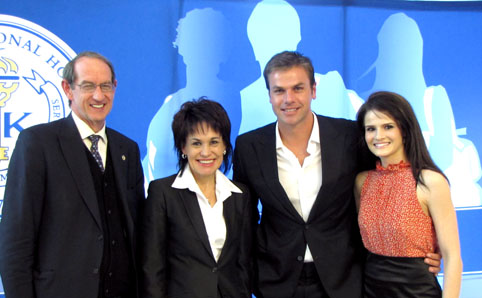|

|
Unlocking potential. At the Golden Key South African Summit 2011 were, from the left: Dr Derek Swemmer, Registrar (UFS); Prof. Driekie Hay, Vice-Rector: Academic; Mr Ryk Neethling and Ms Charlene Gunter, Director: Golden Key International Honour Society, South Africa.
Photo: Phelekwa Mpono |
More than 130 delegates are gathering for the Golden Key, South African Summit at the Bloemfontein Campus of the University of the Free State (UFS). Golden Key International Honour Society recognises academic excellence and uses knowledge to transform lives. It has 400 chapters in eight countries. Of South Africa’s 12 chapters, 11 were present at the summit.
Prof. Driekie Hay, Vice-Rector: Academic at the UFS, welcomed delegates from the respective chapters. She commended them for their perseverance and dedication to excel. “Your academic aspirations and commitment contribute to cultivating a culture of excellence. It will provide a better future for every South African citizen,” she said. Prof. Hay challenged delegates also to “act” by turning their knowledge into actions to advance not only themselves but also society. She also urged them to “discover” everything about themselves, their chosen disciplines, allies and oppositions. “Mostly, you must internalise the spirit of lifelong learning,” she said.
Mr Ryk Neethling, Olympic gold medallist and businessman, was the first keynote speaker. He took everyone through the steps that ultimately led to the moment of victory for him and his team. “We found a way to compete with heart and determination in the 2004 Olympic Games. We were prepared and we took everyone by surprise. “To achieve what one has set one’s mind to, we must dream big,” he said. “Play your part in the team and be confident. Remember that you are victors and not victims,” he urged. He further emphasised the importance of making one’s own luck and, most of all, never to give up.
Another speaker for the summit includes Ms Peggy-Sue Khumalo, former Miss South Africa. Dr Derek Swemmer, Registrar (UFS) will present a workshop on Strategic Action Planning.
This event is the first external lecture that is presented in the Metro’s found in the new Health Sciences Building on the Bloemfontein Campus of the UFS.